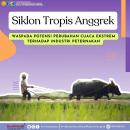What is vesicular stomatitis and what causes it?
Vesicular stomatitis (ves-ICK-ular st-OO-ma-TIE-tis) is an important viral disease of animals and can infect humans. It is caused by a virus and is found in the United States, Mexico, Central America and parts of South America. The vesicular stomatitis virus (VSV) causes blister-like sores on the mouths or feet of infected animals. The signs of this disease are almost identical to three other important diseases of animals: foot and mouth disease, swine vesicular disease and vesicular exanthema of swine.
What animals get vesicular stomatitis?
Horses, donkeys, mules, cattle, swine, and South American camelids can be aff ected by VSV. Horses are usually aff ected the most severely. Sheep and goats are resistant and rarely show signs of disease.
How can my animal get vesicular stomatitis?
VSV can be transmitted by insects (vector), especially sand flies and black flies. It can also be transmitted by direct contact with infected animals and contaminated objects known as fomites. Once VSV has entered a herd, the disease spreads between animals through contact with saliva or fluid from ruptured sores from infected animals. How does vesicular stomatitis affect my animal? In animals, VSV causes blister-like sores to form in the mouth, gums, tongue, lips, nostrils, hooves and teats. These blisters swell and break, leaving raw tissue that is so painful that infected animals often refuse to eat or drink. When blisters occur around the hooves, lameness can occur. Weight loss usually follows, and in dairy cows a severe drop in milk production is often seen.
Can I get vesicular stomatitis?
Yes. Humans can become infected with VSV when handling infected animals (direct contact). In aff ected people, vesicular stomatitis causes a fl u-like illness with symptoms of fever, muscle aches, headache and weakness. Rarely, humans can get oral blisters similar to cold sores. Recovery usually occurs in four to seven days.
Who should I contact, if I suspect vesicular stomatitis?
In Animals – Contact your veterinarian immediately. Since VSV is so similar to FMD, it requires immediate notifi cation of veterinary authorities In Humans – Contact your physician and tell them you have been in contact with animals with VSV.
How can I protect my animal from vesicular stomatitis?
On-farm insect control programs may help reduce the likelihood of disease entering and spreading through a farm. When an outbreak of VSV occurs in a region, horse owners can protect their animals by keeping them on the farm and avoiding contact with other horses. Good sanitation and quarantine practices of aff ected farms will usually contain the infection until it dies out. How can I protect myself from vesicular stomatitis? Use protective measures such as gloves and a mask when handling animals suspected of having vesicular stomatitis. When working with animals, good personal hygiene with frequent hand washing is important in controlling most diseases that can spread from animals to humans.










